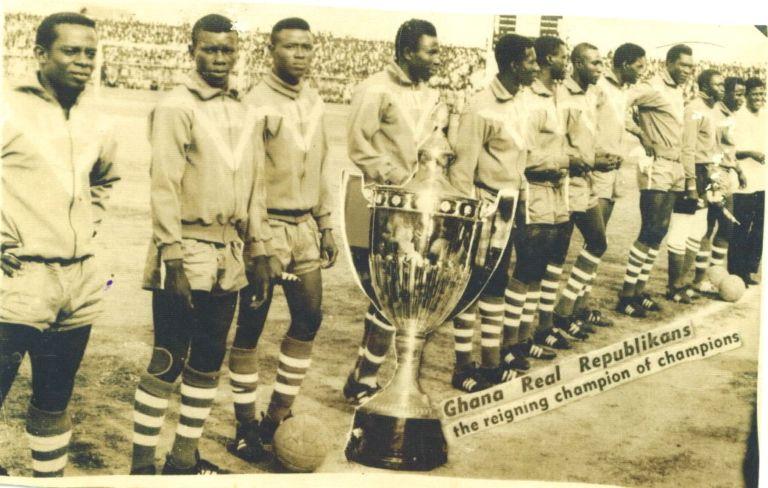
“Beyond the Pitch” is a riveting BBC World Service radio documentary that explores the close links between the “beautiful game” of football and the “dirty game” of politics in multiple African countries.
Produced by Farayi Mungazi and Penny Dale, the 50-minute feature aired on the eve of the 2017 Africa Cup of Nations (AFCON) in Gabon, which marks the 60th anniversary of the continent’s most prestigious sporting event.
The documentary opens with Nigeria’s boycott of AFCON 1996 in South Africa. The last-minute withdrawal of the Super Eagles came in retaliation for President Nelson Mandela’s scathing criticism of Nigerian dictator Sani Abacha’s regime, which in November 1995 had executed author Ken Saro Wiwa and eight more Ogoni environmental activists in a sham trial.
The next segment is captivating and among the most historically significant. It tells the story of how football helped Algeria’s struggle for independence from France through mesmerizing interviews with Mohamed and Khadidja Maouche. He was a young professional footballer in France in the late 1950s, but the newlyweds were also members of the National Liberation Front (FLN), the main Algerian liberation movement. The couple reveals how they secretly worked together to facilitate an exodus of Algerian-born footballers from their French clubs to play for the FLN “national” team. “No-one knew I was married to Maouche,” Khadidja says. “They would just be told a FLN activist wanted to speak to them. I would talk to them individually to say: ‘It’s an order, that’s it,’ and they all agreed.” In 1960 Mohamed Maouche eventually joined the FLN team, which played matches in front of large crowds in North Africa, the Middle East, East Asia, and Eastern Europe. “We were the first ambassadors of the revolution and the Algerian people,” he recalls with profound emotion half a century later.
Burundi’s current President Pierre Nkurunziza, a qualified football coach and owner of Hallelujah FC, is mentioned as a bridge to a terrific interview with Dr. Hikabwa Chipande, an historian and Michigan State University alumnus (PhD, 2015). Now a lecturer in African history at the University of Zambia, Chipande brings the BBC reporter through the archives in Lusaka where he conducted doctoral research on the history of Zambian football. As they look at sources documenting former president Kenneth Kaunda’s passion for and involvement in the game, Chipande points to a 1974 photograph of Kaunda serving food to the national team—quite an endearing, populist image. Mungazi then travels to Luanshya, on the Copperbelt, to talk football and politics with Dickson Makwaza, one of the players served by Kaunda in 1974, and with 91-year-old Tom Mtine, a legendary football administrator.
In the second half of the documentary we leap ahead to AFCON 2010 in Angola. The Togo national team bus was targeted by armed separatists from the enclave of Cabinda at the border with the Republic of Congo: “probably the most dramatic moment ‘off the pitch’ in the history of the Africa Cup of Nations,” Mungazi says. The armed attack killed two men and wounded several others: “one of the worst experiences I’ve had in my life,” said Togolese striker and English Premier League veteran, Emmanuel Adebayor.
The last time Uganda qualified for AFCON was in 1978 when the infamous Idi Amin was still in power. A local academic and former national team players explain how Amin, a keen boxer himself, bankrolled sports during his dictatorship (1971-79) to boost nationalism and also as a weapon of mass distraction. But we also hear of the traumatic experiences of John Ntensibe and Mama Baker. The former was imprisoned and forced to load bodies onto trucks after scoring the winning goal for Express FC against the army team, Simba, while Baker, a devoted Express supporter, was arrested twice for little more than being Uganda’s biggest soccer fan.
Fast forward again to the 21st century: we hear about George Weah, Africa’s only World Player of the Year (1995), who launched a career in politics in Liberia after retiring from the game. Weah lost a presidential election in 2004 (to future Nobel Peace laureate Ellen Sirleaf Johnson), but recently won a Senate seat and may run again for his country’s highest office.
The final chapter in the story of the links between politics and football focuses on Ghana. There, top clubs Accra Hearts of Oak and Kumasi Asante Kotoko have long been entangled in party politics and presidential contests. Veteran Ghanaian reporter Kwabena Yeboah also describes the emergence of Real Republikans, a super club of the 1960s closely connected to President Kwame Nkrumah. Subsequent regimes in Ghana, it is noted, used the men’s national team, the Black Stars, to strengthen their popularity and “perpetuate their reign.”
As a scholar who has been writing about African football history, culture, and politics for a long time, I found Farayi Mungazi and Penny Dale’s “Beyond the Pitch” documentary to be finely researched and evocatively presented through African voices. The producers did well to carefully bring out the game’s contradictory capacity to be a force for empowerment and disempowerment. What a great way to get ready for the upcoming 2017 AFCON in Gabon. And what a wonderful resource for teaching and research.
Click here to listen and download the podcast version of the documentary.
Author: Peter Alegi
The new documentary film Ciudad Deportiva tells the little-known story of the “Sport City” of Boca Juniors, Argentina’s most popular soccer team.
The sport and leisure park was conceived by Alberto J. Armando, the president of Boca in the late 1950s and 1960s. At the time, it was one of the most ambitious architectural projects in Argentine history. Construction began in 1965 on seven islands on the Rio de la Plata, with plans for a 140,000-capacity stadium, swimming pools, tennis courts, and ample spaces for recreation.
An international team worked on the film for more than three years. Alex Galarza, a PhD student in Latin American history at Michigan State University, shared his doctoral research with four Argentine journalists: Lucas Taskar, Maximiliano Acosta, Nicolás Franciulli and Micael Franciulli. The group conducted on-camera interviews with Boca “elders” and experts, complementing these with rare archival footage, music, and documents unearthed in libraries and archives.
The Spanish language film (with English subtitles) evocatively shows how and why the “Ciudad Deportiva” urban renaissance construction project failed. In doing so, it sheds new light on the vital role of soccer clubs in Buenos Aires’ urban planning, politics, and everyday life. The documentary is freely available on YouTube where it will likely find a warm reception not only among scholars of Latin America and urban life but also among intellectually curious soccer fans.
Laurent N’Dri Pokou died on November 13, 2016, after a long illness. He was 69 years old. Pokou in the 1970s symbolized the success of postcolonial African football and, like his fellow Ivorian, Didier Drogba, many years later, captured the imagination of an entire generation of Africans.
Pokou was born on August 8, 1947, in Abidjan, Ivory Coast. Growing up in a working-class family, his father worked as a railway company office clerk, football was everywhere. He was first spotted in neighborhood matches by a talent scout from ASEC Mimosas, one of Abidjan’s two powerhouse clubs (the other being Africa Sports).
ASEC quickly signed Pokou and deemed him so valuable that when the Pokou family relocated to the northern city of Bouaké in 1962, the club sent for the youngster and managed to convince his family to allow Laurent to return to Abidjan. Once back with Mimosas, Pokou sharpened his skills and transformed into an archetypal goalscorer: mobile, opportunistic, a fine dribbler, and clinical finisher. It was no surprise that he earned his first call up to Ivory Coast’s national team—known as the Elephants—just in time for the 1968 African Cup of Nations in Ethiopia.
In the semifinal in Asmara (then part of Ethiopia), 21-year-old Pokou netted twice in Ivory Coast’s 4-3 extra time loss to Ghana. He also scored the only goal in a 1-0 win over Ethiopia in the third-place final. Pokou’s six goals meant he was crowned top scorer of the continental showcase.
Two years later, at the African Cup of Nations in Sudan, Pokou confirmed his status as one of the most prolific African strikers of his time. His five goals in a 6-1 rout of Ethiopia put the world on notice. The Elephants reached the semifinals, but once again lost to Ghana’s Black Stars in extra time. Pokou’s eight goals made him the tournament’s top scorer for a second consecutive time and his fourteen goals set a career scoring record for the African Cup of Nations. (Twenty-six years later, Samuel Eto’o of Cameroon finally broke it.)
Unfortunately, in February 1971 Pokou suffered a terrible knee injury during a typically combative ASEC vs. Africa Sports derby. After an operation in France and seven months of diligent rehabilitation, he returned to the pitch.
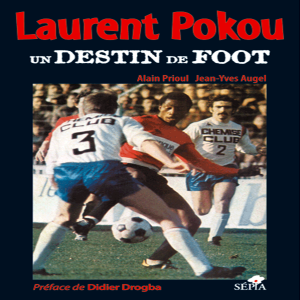 Meanwhile, according to the French journalist Alain Prioul, author of a biography of Pokou, the Ivorian President Félix Houphouët-Boigny had been preventing a number of overseas clubs from securing Pokou’s services. Finally, in December 1973 the president dropped his opposition to a transfer. ASEC, having won two league titles in a row, sold Pokou to French club Stade Rennaise (aka Rennes).
Meanwhile, according to the French journalist Alain Prioul, author of a biography of Pokou, the Ivorian President Félix Houphouët-Boigny had been preventing a number of overseas clubs from securing Pokou’s services. Finally, in December 1973 the president dropped his opposition to a transfer. ASEC, having won two league titles in a row, sold Pokou to French club Stade Rennaise (aka Rennes).
As soon as he arrived in Brittany, the Ivorian striker began to deliver. Playing only the second half of the 1973/74 season, he scored seven goals in thirteen matches. The following season, Pokou increased his goal total to fourteen, but Rennes were relegated to the second division.
In 1975/76, he was having a brilliant year with seventeen goals in just twelve matches when he suffered another serious knee injury. After an operation and rehabilitation, he returned to the starting side and contributed six goals in the final stretch of the season.
In 1976/77 Pokou transferred to Nancy where he played alongside future three-time Ballon d’Or winner, Michel Platini. But bad luck struck again: another knee injury! This latest setback sharply curtailed his playing time over two physically and emotionally painful seasons. Pokou decided to return to Rennes for the 1978/79 season, even if that meant playing in the second division. His injury-plagued career in France ended on a sour note: he assaulted a referee on the pitch and received an eighteen-month suspension.
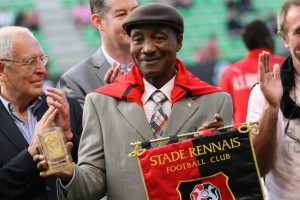 Pokou returned home to ASEC Abidjan in 1980. He earned two more caps for Ivory Coast at the 1980 African Cup of Nations before retiring. After hanging up his boots, Pokou spent many years as a youth development coach for the Ivorian Football Federation (FIF) and also served as a FIFA Ambassador.
Pokou returned home to ASEC Abidjan in 1980. He earned two more caps for Ivory Coast at the 1980 African Cup of Nations before retiring. After hanging up his boots, Pokou spent many years as a youth development coach for the Ivorian Football Federation (FIF) and also served as a FIFA Ambassador.
Long before Didier Drogba became a household name, another talented, though distinctly less fortunate, Ivorian named Laurent Pokou did much to strengthen African football’s self-confidence and to legitimize the continent’s players status as big-time stars in the global game.
The AmaXhosa Maradona
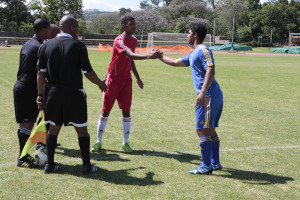
The story of Abongile Elton Qobisa, also known as the “Xhosa Maradona,” has not been covered by ESPN, SKY, SABC, or FIFA media. But Tarminder Kaur, a postdoctoral fellow at the University of the Free State in South Africa, is determined not to allow us to forget him.
On October 27, the moving tale about Qobisa will be the subject of the Football Scholars Forum’s 37th session. Kaur’s paper is based on ethnographic fieldwork in the Western Cape region. It engages critically with “sport-for-development” discourses and its limits, a topic Pelle Kvalsund and Hikabwa Chipande, among others, have written extensively about on this blog.
“In contemporary South Africa,” Kaur writes, “soccer is discursively portrayed as a tool for ‘development’ and socialization of ‘black’ youth living in structurally constrained conditions. Indeed, it is the stories of ‘rags to riches’ through sport talent and success that continue to spark imagination for possibilities through soccer for the marginalized and those in need of ‘development.'”
The paper deftly critiques these discourses by presenting an intriguingly diverse cast of male characters. Readers are introduced to passionate township players, devoted coaches, hardcore fans, and well-meaning patrons of the game. Through numerous oral interviews and personal observations, the study reveals the multiple ways in which young black men from humble circumstances “create and find meaning in practices of soccer.” In a context of economic insecurity and social instability, the author highlights how “talent and opportunities in soccer were both a gift and a curse for the amaXhosa Maradona.”
To participate in the online forum, please visit the FSF website.
Click here for the Sport in Africa web dossier compiled by the African Studies Library at Leiden University.
Politics and Soccer in the Middle East
The Football Scholars Forum opened its 2016-17 season on September 19 with a discussion of James Dorsey’s long-awaited new book, The Turbulent World of Middle East Soccer.
A journalist and Senior Fellow at the S. Rajaratnam School of International Studies at Singapore’s Nanyang Technological University, Dorsey’s blog “(has) become a reference point for those seeking the latest information as well as looking at the broader picture” on Middle East soccer and politics, according to FSF member Alon Raab, who teaches at the University of California Irvine.
Twenty participants spread out across North and South America, Africa, Europe, and, naturally, the Middle East engaged in a lively online discussion with the author. Dorsey began by describing the origin of the project and a disclaimer that he is neither a player or fan of the game. The book, he stated, is about politics, not soccer. But he immediately qualified this quasi-heretical statement (among fútbologists, at least) by stressing that sports and politics are always linked, though at different levels of intensity depending on the place and time.
Dorsey emphasized the importance of young Egyptian ultras in the overthrow of Mubarak and of stadiums as spaces of mobilization, dissent, and censorship. A particularly interesting thread of the forum was the focus on social media as scholarly sources–“cyber-ethnography”–and also as an invaluable space for public discourse.
Prompted by new questions, Dorsey shared his thoughts on gender issues; the limited influence of “Muscular Islam” in its diverse interpretations (from conservative to liberal) on the region’s football culture; racial and ethnic discrimination; and how the failed July 15 coup in Turkey means soccer fans have been caught in the wider web of repression carried out by the Erdogan regime.
Despite the grim status quo for people and football in war-ravaged Syria, Dorsey closed on an optimistic note, arguing that we are at the beginning of a long process of potentially positive change in the Middle East. Time will tell, but what is certain is that the game will continue to serve “as an arena where struggles for political control, protest and resistance, self-respect and gender rights are played out.”
Click here for an audio recording of the session.
For information about the next Football Scholars Forum on October 27, please visit footballscholars.org.
The Football Bard of Iceland Makes History
Guðmundur Benediktsson who?
On Wednesday, June 22, the 41-year-old Icelandic announcer’s emotional call of Iceland’s winning goal against Austria at Euro 2016 went viral. The moment was immediately enshrined into the unofficial Hall of Fame of soccer broadcasting.
Benediktsson is no ordinary broadcaster. He played for Iceland from 1994 to 2001 and has coached steadily since the end of his playing career in 2009, most recently as an assistant at KR Reykjavík — the tiny island nation’s most celebrated club. The family love of the game extends to Benediktsson’s 19-year-old son, Albert Guðmundsson, who is on the books of PSV Eindhoven, and whose mother is a former Iceland international.
Iceland and Austria were in stoppage time, with the score tied 1-1. Austria, needing to win to advance to the second round, was launching its final desperate attacks. Iceland was deep in its defensive bunker, knowing a point would be enough to earn an historic qualification to the knockout phase.
With 45 seconds left, the Icelandic defense brutishly clears a ball, which randomly finds Bjarnason all alone charging full speed ahead towards the Austrian goal. In the blink of an eye, a three-on-one breakaway develops.
Benediktsson does more than announce the Iceland players’ excited forward movement. He seems to thrust them towards the Austrian goal.
There will be no running out the clock by the corner flag. No way. Iceland are beyond the point of no return.
Bjarnason slices a deliciously inviting assist across the penalty box. Traustason, a substitute, slides in at the far post and strikes the ball with his left foot.
Benediktsson’s first eruption literally encourages the ball into the net, past the outstretched hands of the diving Austrian goalkeeper: “Jaaaa!”
“Jaaaa! Jaaaa! Jaaaa! Jaaaa!” Benediktsson loses it. His primal scream is like “a ‘do’ sung [in Icelandic] from the chest that would leave Caruso forever mute,” in the words of Eduardo Galeano.
It’s more than orgasmic. “Maybe if I hadn’t made love for eighteen years, and had given up hope of doing so for another eighteen, and then suddenly, out of the blue, an opportunity presented itself,” Nick Hornby reminds us in Fever Pitch, “maybe in these circumstances it would be possible to recreate an approximation of that [. . .] moment.”
The Polish referee, Szymon Marciniak, blows the whistle. It’s over! Iceland 2, Austria 1. Iceland is through to the last 16.
Benediktsson, exhausted, goes quiet.
Should Iceland pulls off a miraculous victory against England on Monday (June 27), Benediktsson’s performance may surpass the one that made him world famous.
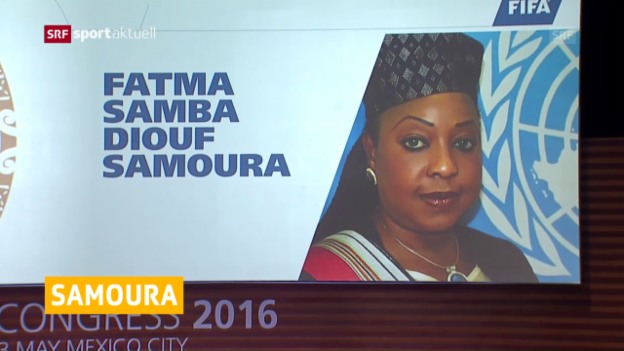
Fatma Samba Diop Samoura of Senegal, a career United Nations diplomat, was recently appointed by FIFA President Gianni Infantino as the world body’s new secretary general. “She will bring a fresh wind to FIFA—someone from outside,” Infantino declared.
Listen to my radio interview with Assumpta Oturu as we discuss the significance of Samoura’s appointment and its possible implications for substantive reforms at scandal-ridden FIFA.
The interview originally aired on KPFK’s “Spotlight Africa” program on June 3, 2016.